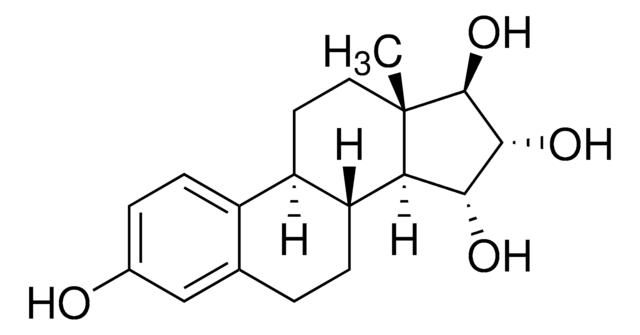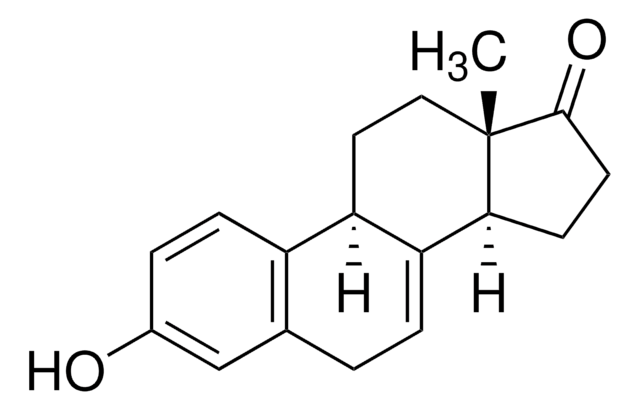E1253
Estriol
≥97%
Synonym(s):
1,3,5(10)-Estratriene-3,16α,17β-triol, 16α-Hydroxyestradiol, 3,16α,17β-Trihydroxy-1,3,5(10)-estratriene
About This Item
Recommended Products
biological source
synthetic (organic)
Quality Level
sterility
non-sterile
Assay
≥97%
form
powder
mp
280-282 °C (lit.)
solubility
pyridine: 50 mg/mL, clear, colorless to faintly brownish-yellow
shipped in
ambient
storage temp.
room temp
SMILES string
C[C@]12CC[C@H]3[C@@H](CCc4cc(O)ccc34)[C@@H]1C[C@@H](O)[C@@H]2O
InChI
1S/C18H24O3/c1-18-7-6-13-12-5-3-11(19)8-10(12)2-4-14(13)15(18)9-16(20)17(18)21/h3,5,8,13-17,19-21H,2,4,6-7,9H2,1H3/t13-,14-,15+,16-,17+,18+/m1/s1
InChI key
PROQIPRRNZUXQM-ZXXIGWHRSA-N
Gene Information
human ... SERPINA6(866)
mouse ... Esr1(13982)
rat ... Ar(24208)
Looking for similar products? Visit Product Comparison Guide
Application
Biochem/physiol Actions
related product
Signal Word
Danger
Hazard Statements
Precautionary Statements
Hazard Classifications
Carc. 2 - Lact. - Repr. 1A
Storage Class Code
6.1C - Combustible acute toxic Cat.3 / toxic compounds or compounds which causing chronic effects
WGK
WGK 3
Personal Protective Equipment
Choose from one of the most recent versions:
Certificates of Analysis (COA)
Don't see the Right Version?
If you require a particular version, you can look up a specific certificate by the Lot or Batch number.
Already Own This Product?
Find documentation for the products that you have recently purchased in the Document Library.
Customers Also Viewed
Our team of scientists has experience in all areas of research including Life Science, Material Science, Chemical Synthesis, Chromatography, Analytical and many others.
Contact Technical Service







